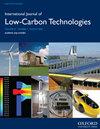纳米粒子对盐水膜蒸发的影响。
IF 2.3
4区 工程技术
Q3 ENERGY & FUELS
引用次数: 0
摘要
世界各地对淡水供应的需求使人们对海水淡化的研究产生了极大的兴趣,这导致了该领域各种创新技术的发展。本文的数值研究有助于在基液中引入纳米颗粒来改善蒸发脱盐操作。本研究考虑的脱盐技术包括沿垂直通道内壁下降的盐水膜,由恒定的热流均匀加热。用有限差分法对边界和界面条件下的流动方程和传热传质方程进行了数值求解。我们考虑了10 g.kg-1和39 g.kg-1两个盐度值,分别对应于微咸水和具有不同类型和体积分数的纳米颗粒的海水,以研究这些参数组合对蒸发脱盐增强的影响。结果表明,纳米颗粒注入盐水后,由于其对热物性的积极影响,蒸发过程得到改善。另外,Al2O3的蒸发脱盐效果明显优于TiO2和铜。此外,我们可以用2%的氧化铝代替4%的TiO2达到相同的传热传质性能。本文章由计算机程序翻译,如有差异,请以英文原文为准。
Effect of nanoparticles on the evaporation of a salt water film.
The need for freshwater supply in different parts of the world has given great interest to the study of seawater desalination which has led to the development of various innovative techniques in this field. The present numerical study contributes to the improvement of the evaporative desalination operation by introducing nanoparticles into the base fluid. The desalination technique considered in this study consists of a saltwater film falling along the inner wall of a vertical channel heated uniformly by a constant heat flux. The equations governing the flow and the heat and mass transfer associated with the boundary and interface conditions are solved numerically using the finite difference method. We considered two values of salinity, 10 g.kg-1 and 39 g.kg-1 which correspond respectively to brackish water and sea water with different types and volume fractions of nanoparticles in order to study the effect of the combination of these parameters on the enhancement of desalination by evaporation. The results showed that the evaporation process by injecting nanoparticles into salt water improves due to its positive effect on thermophysical properties. In addition, Al2O3 is significantly better for evaporative desalination than TiO2 and copper. Moreover, we can achieve the same heat and mass transfer performance by using 2% alumina instead of 4% TiO2.
求助全文
通过发布文献求助,成功后即可免费获取论文全文。
去求助
来源期刊

International Journal of Low-carbon Technologies
Engineering-Architecture
CiteScore
4.30
自引率
4.30%
发文量
106
审稿时长
27 weeks
期刊介绍:
The International Journal of Low-Carbon Technologies is a quarterly publication concerned with the challenge of climate change and its effects on the built environment and sustainability. The Journal publishes original, quality research papers on issues of climate change, sustainable development and the built environment related to architecture, building services engineering, civil engineering, building engineering, urban design and other disciplines. It features in-depth articles, technical notes, review papers, book reviews and special issues devoted to international conferences. The journal encourages submissions related to interdisciplinary research in the built environment. The journal is available in paper and electronic formats. All articles are peer-reviewed by leading experts in the field.
 求助内容:
求助内容: 应助结果提醒方式:
应助结果提醒方式:


